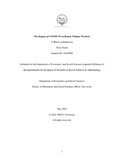| dc.contributor.advisor | Rahman, Dr. Shahidur | |
| dc.contributor.author | Farah, Faiza | |
| dc.date.accessioned | 2022-11-22T06:20:02Z | |
| dc.date.available | 2022-11-22T06:20:02Z | |
| dc.date.copyright | 2022 | |
| dc.date.issued | 2022-05 | |
| dc.identifier.other | ID: 18105009 | |
| dc.identifier.uri | http://hdl.handle.net/10361/17605 | |
| dc.description | This thesis is submitted in partial fulfillment of the requirements for the degree of Bachelor of Social Science in Anthropology, 2022. | en_US |
| dc.description | Cataloged from PDF version of thesis. | |
| dc.description | Includes bibliographical references (pages 57-62). | |
| dc.description.abstract | Bangladesh has a rich history of growth and development, which has been heavily impacted by
the COVID-19 pandemic. The pandemic has shaken the landscape of growth and development due
to the six-month-long nationwide lockdown. The abrupt economic shock has resulted in the
struggling lives of millions of people with prevalent financial vulnerability. Major sectors like
healthcare, retail, and RMG with high government regulation have been tremendously impacted.
Hence, the integral people of these booming industries have witnessed a greater colossal economic
shock with no prior financial security. Like most government-regulated formal sectors, these
industries had recovered quickly and managed to take back most of their employees due to the
government's financial aid. However, the informal sectors with significant prevalent instability
were put at severe risk; since, the beauty parlour industry was not allowed to re-open like various
other workplaces and factories due to immense safety measures. Hence, this study aims to
understand the impact of COVID-19 on the beauty parlour workers, who are the most integral part
of the industry. For this qualitative study, semi-structured interviews were conducted with 6
participants from Kalachandpur who were asked to share their experiences throughout the
pandemic. Mark Anner's theory of "Labour Market Despotism" has been used to understand the
nature of labour responsible for the working conditions of beauty parlour workers during the pre
and post COVID-19. The findings were skewed in one direction, which stated that the prevalent
structural inequality and economic factors have pushed the workers' living standards and working
conditions into a persisting cycle of suffering and hurdles. This study contributes to the literature
on working conditions, informal economy and challenges of the pandemic. | en_US |
| dc.description.statementofresponsibility | Faiza Farah | |
| dc.format.extent | 79 Pages | |
| dc.language.iso | en_US | en_US |
| dc.publisher | Brac University | en_US |
| dc.rights | Brac University theses are protected by copyright. They may be viewed from this source for any purpose, but reproduction or distribution in any format is prohibited without written permission. | |
| dc.subject | Impact of COVID-19 | en_US |
| dc.subject | Beauty Parlour Workers | en_US |
| dc.subject.lcsh | COVID-19 (Disease)--Economic aspects | |
| dc.subject.lcsh | Women--Employment | |
| dc.title | The impact of COVID-19 on beauty parlour workers | en_US |
| dc.type | Thesis | en_US |
| dc.contributor.department | Department of Economics and Social Sciences, Brac University | |
| dc.description.degree | BSS in Anthropology | |

